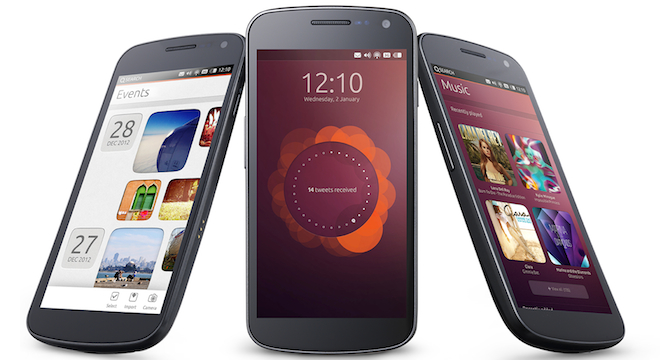Canonical, the UK software firm that leads development of Ubuntu, the open source Linux PC operating system, on Wednesday plunged headfirst into the increasingly crowded smartphone market, announcing “Ubuntu for phones.”
Canonical promoted several unique features of the new Ubuntu mobile operating system, the most radical of which is the ability to hook up an external monitor, keyboard and mouse to a Ubuntu smartphone and use it as a “full PC” running a local version of Ubuntu with “remote Windows apps.”
Other capabilities of Ubuntu for phones demonstrated by Canonical founder Mark Shuttleworth in a video posted Wednesday include the ability to swipe right from the default screen to see a list of most-used apps, web apps and native apps running side-by-side as equals on the operating system (with the ability to receive alerts from either), the capability to change core settings directly from the top navigation bar, individual app controls hidden in a bar at the bottom by default, and several additional functions.
Watch the Ubuntu for phones demo presentation below (starts at 06:30). Web users can also simulate some features by visiting this page on the Canonical website.
Ubuntu for phones will first be made available in a matter of days as a version that runs on unlocked Samsung Galaxy Nexus phones (which normally ship with Google’s Android operating system), according to Ars Technica.
But the full version and native Ubuntu devices still appear to be a ways off: Canonical aims to partner with cellphone manufacturers (original equipment manufacturers, or OEMs) and wireless carriers (operators) to launch wholly new phones that run Ubuntu natively, even hosting a special section on its website to promote the idea that Ubuntu is a worthy industry partner.
The first Ubuntu smartphone is expected to be released in the third quarter of 2013, though no precise details about manufacturer, carrier, countries of availability or pricing have yet been released.
In press materials, Ubuntu said that it was targeting “entry level smartphones,” and outlined the following two user bases as its primary target markets:
“Ubuntu works on any device specification, but it meets the demands of two key segments particularly well: those who want a beautiful but easy to use, basic smartphone and those who want enterprise-grade thin client and desktop capability in a secure smartphone that can be managed using enterprise tools.”
In essence, Ubuntu is seeking to make inroads with those businesses that already use its software for their PCs — which include PC manufacturers Dell, HP, Lenovo and Asustek, although these companies use Ubuntu to certify PCs that later run mostly Windows by the time they are purchased by end-users.
Still, Ubuntu now runs on “over 20 million” individual computers globally, according to the company. Canonical is bullish on Ubuntu’s growth as a PC operating system too, stating that it expects 10 percent of the world’s new PCs in 2014 to ship with the open source operating system.
Whenever it is officially released, Ubuntu for phones will be going up against the dominant two operating systems for mobile devices: Google’s Android and Apple’s iOS software (which powers the iPhone and iPad), but seems destined to clash most with Mozilla’s upcoming Firefox OS, a mobile operating system from the makers of the Firefox browser, the first devices of which are due out in the first quarter.
Amazon and Microsoft are also rumored to be working on their own flagship smartphones for release sometime this year. But even if those devices don’t pan out, Ubuntu is running headfirst into an increasingly mature market, whose users are steadily investing their time and money in existing mobile platforms, making the prospect of switching to a newcomer all the more daunting.






